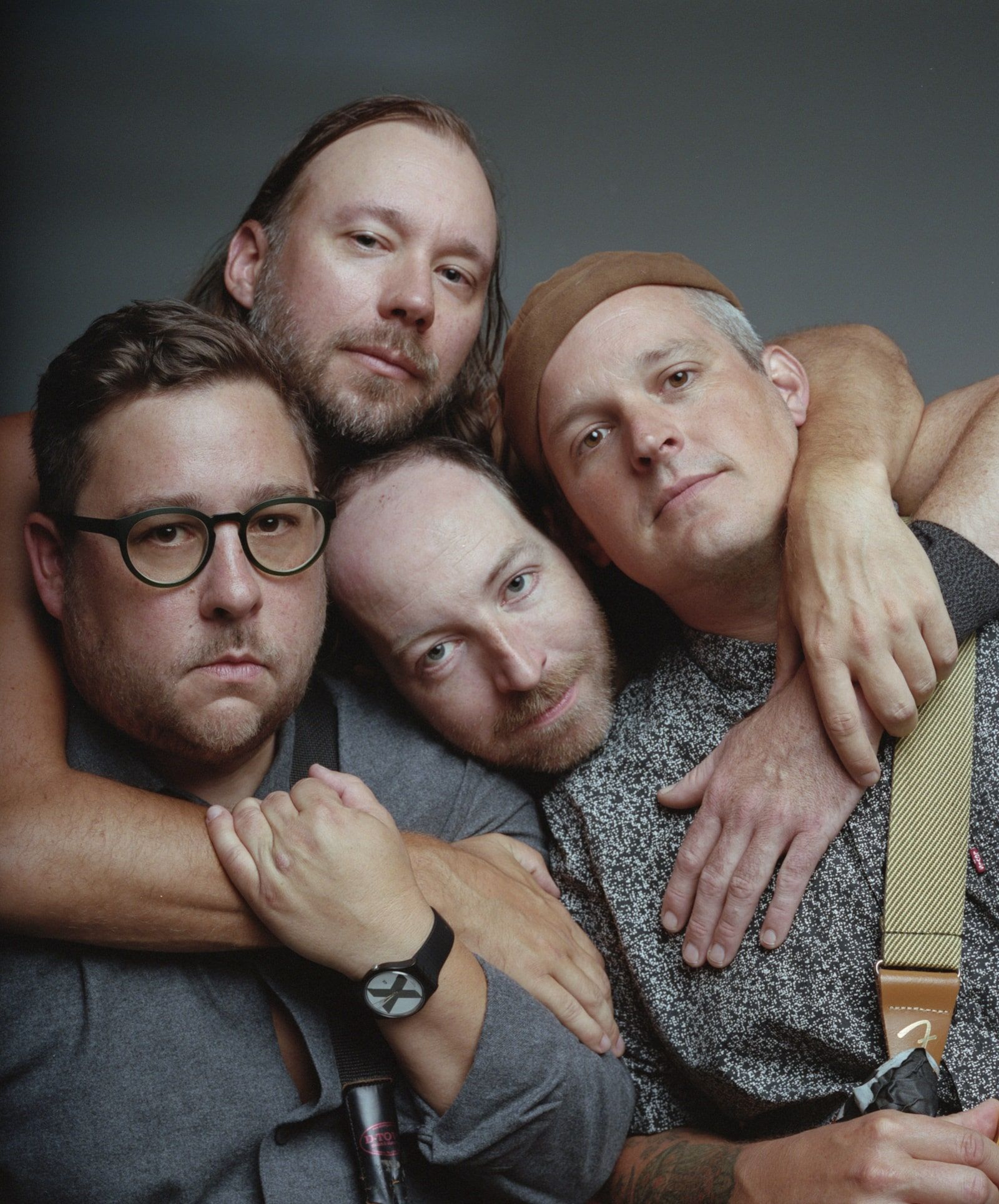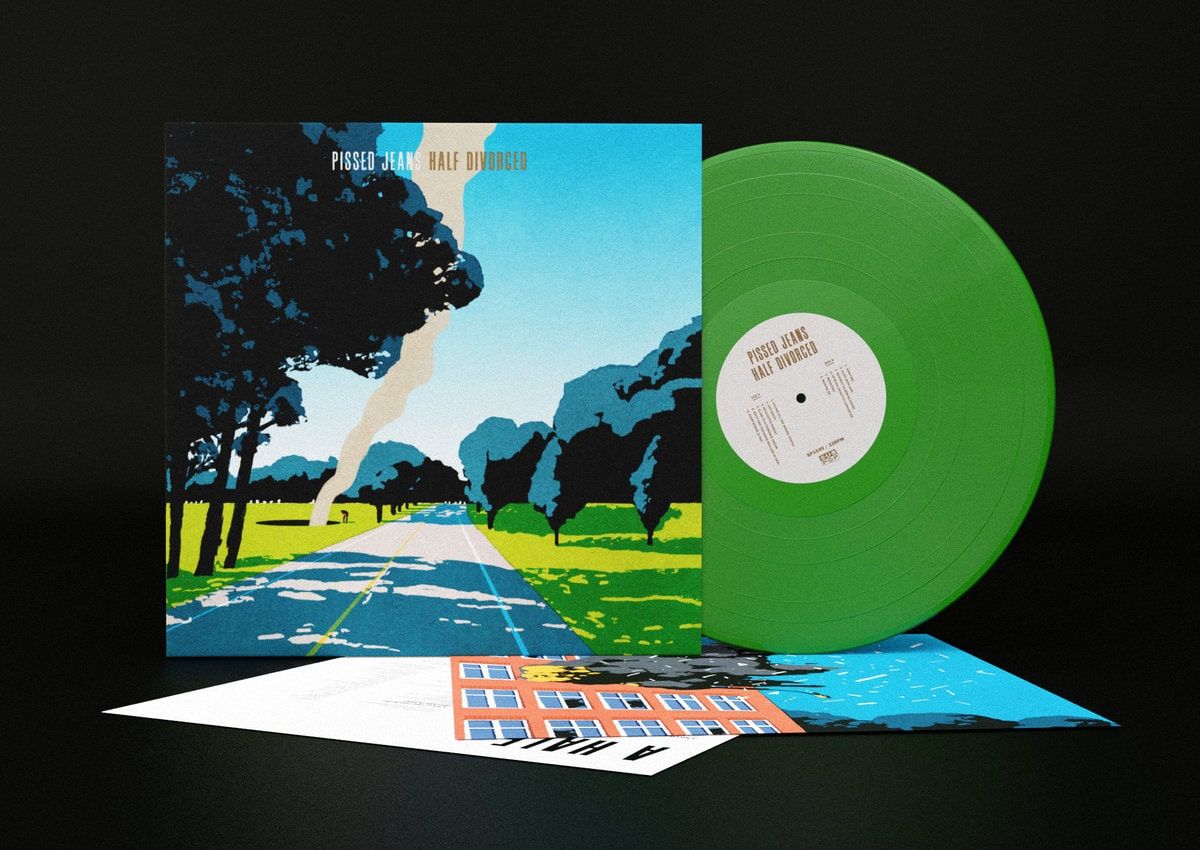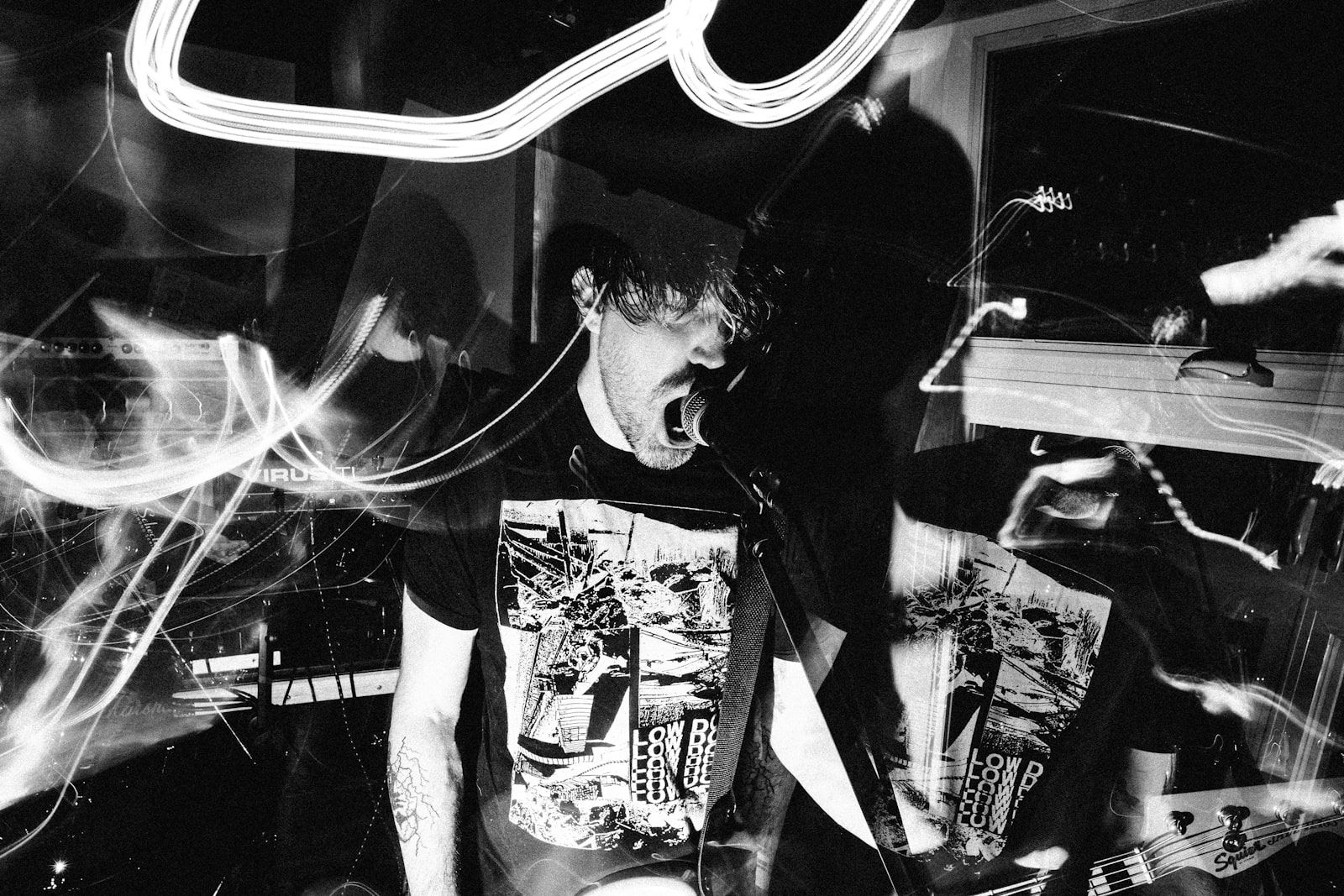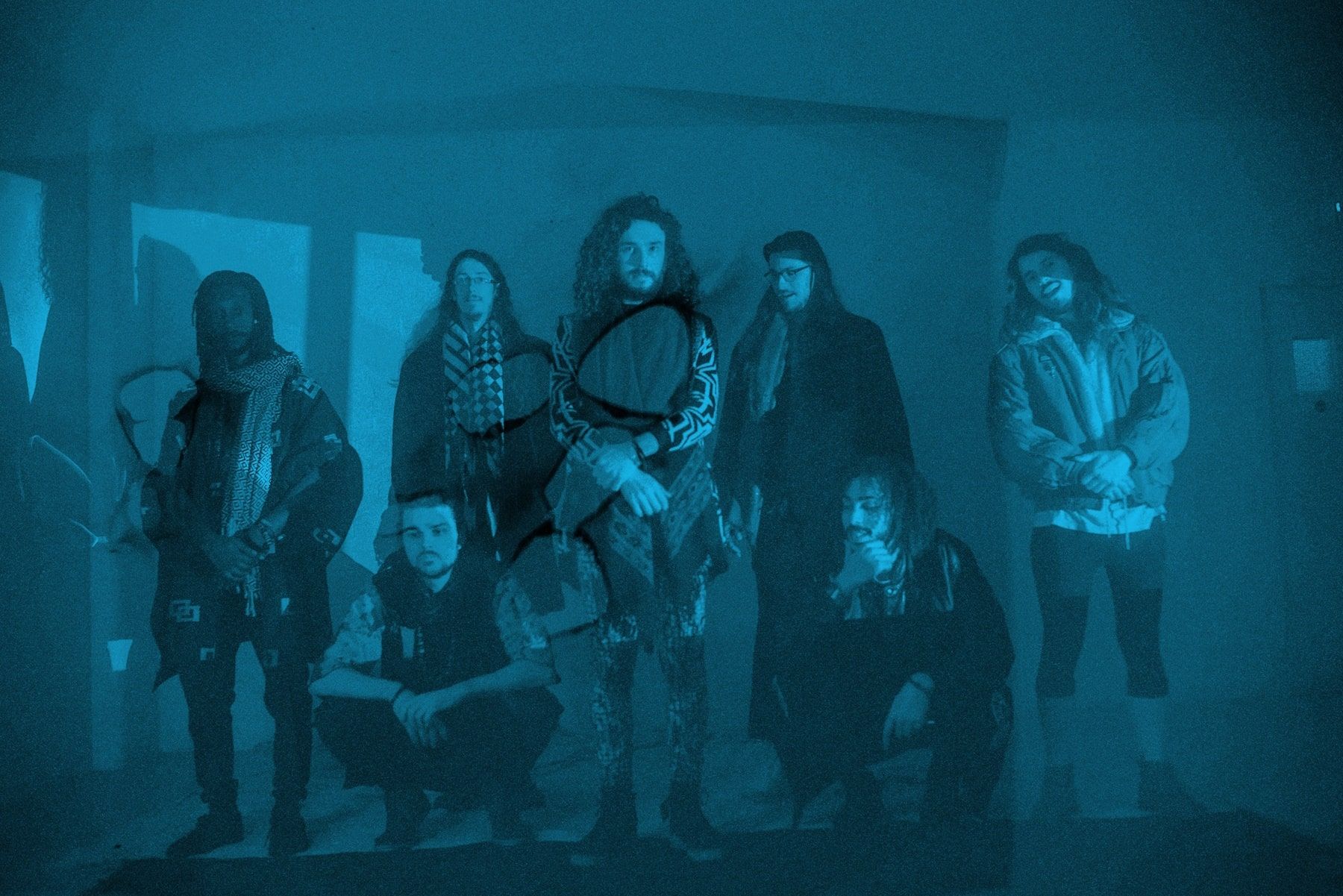After a six-year hiatus since their last album in 2017, “Why Love Now,” PISSED JEANS returns with a compelling dive into the dichotomies of modern adulthood, served with their signature blend of caustic wit and raw musical energy. Today, we’re thrilled to feature an exclusive interview with the band, delving into the heart of “Half Divorced,” exploring the inspirations behind its creation, the challenges and revelations encountered during its production, and the thematic depth of its lyrics.
The band shares insights into their decision to embrace a slower creative process, treating PISSED JEANS as an art project rather than just another band, which allows for a more genuine and fun exploration of their musical and thematic interests.
“Half Divorced” emerged as a narrative of the tensions between the enduring spirit of youth and the hard-hitting realities of grown-up life. The album, produced and mixed by the band and Don Godwin, and recorded at Tonal Park in Takoma Park, Maryland, showcases PISSED JEANS’ ability to evolve their sound while staying true to their roots. Arthur Rizk, who co-produced and mixed “Why Love Now,” mastered the album, ensuring the band’s gritty essence is captured in every track.
The band, comprised of Matt Korvette (vocals), Bradley Fry (guitar), Randy Huth (bass), and Sean McGuinness (drums), embarks on a critical exploration of adulthood’s disenchantments, from the absurdity of helicopter parenting to the existential dread of financial instability. Tracks like “Seatbelt Alarm Silencer” encapsulate the band’s philosophical musings with Korvette’s growling reflections on the illusions of progress.
Half Divorced is available to preorder now from Sub Pop.
Join us in exploring the depths of “Half Divorced” in full interview below.
– In the alchemy of transforming life’s turbulence into art, how does the title “Half Divorced” encapsulate the essence of this album for Pissed Jeans?
To me it’s kind of a jarring title, maybe a little funny too, and it tries to open up a new space between being here and not being here. It’s kind of a non-binary title, now that I think about it for this interview, which also feels appropriate in our current social circumstances. There are other layers to it as well, which we always try to sneak into our titles if we can. Local issues and universal themes, smushed together the way we like it.
– The artwork/ music videos and visual elements play a significant role in the overall narrative of “Half Divorced.” How do these visual components complement the musical themes?
In both of our music videos, we are more or less performing our songs, which felt like the way to go for a few reasons. One, we have fun playing our songs, and are at a point where we’re comfortable enough in our own skin to have a small team of video-people standing around watching us do it. Another reason is that we aren’t a big-time touring band. There are lots of places we’ve never been, and probably will never go, so if someone wanted to see what we currently look like, and what our energy and attitudes are like, they can watch a video. Seemed like a better option than some sort of gauzy, distorted visuals that don’t really give you a window into us as people.
– The decision to not rush “Half Divorced” and treat Pissed Jeans as an art project rather than a conventional band is intriguing. How does this approach influence the creative dynamics within the band?
It’s crazy to me that most people don’t do their punk or indie bands this way, where the fun comes first! Why does everyone feel like they need to make a living off their passions? It’s great if you can, but I am content to work a regular job and have Pissed Jeans be the fun thing I run to afterwards, rather than depending on Pissed Jeans to keep the heat on and food in the fridge.
It frees us up to just have fun with it, and be ourselves, rather than worried about maintaining (or gaining) some level of popularity and success for our own survival. I think that some people connect with us because they can tell we’re doing what we want and having a hell of a time doing it; we’re not just trying to reverse focus-group what we think our audience wants back to them. That would not be good.
– The album flirts with pop punk in a way that’s new for Pissed Jeans. What inspired this sonic exploration, and were there any unexpected challenges or revelations during this process?
Well, we’re six albums deep now, which is an interesting and strange place to be as a punk band. How do you stay fresh, without “maturing”, which generally translates in the indie world to “playing something poppy and soft instead of punk or hardcore”.
We still want to sound like ourselves, but we want to keep pushing at our own boundaries, and find new ways to integrate sounds and styles that make sense, but aren’t just the same song we’ve already written a dozen times. I think we found it fun to write our fastest, most aggressive album at our advanced age, and integrating more melodic bits here and there just felt natural.
I personally wanted to write a bunch of songs that would be fun to play live, and I think it worked out as planned.
– Pissed Jeans has a unique way of tackling the mundane and the macabre with equal fervor. How do you decide what subjects make the cut for a song or an album?
I write all the lyrics, and really I just try to work out topics that personally get me going. Either they scare me, or frustrate me, or anger me, or make me laugh or disgusted (or all of the above). It’s important to me that I feel like I’m giving an authentic piece of my mind, that what I’m saying is for real, even if there’s some layer of sarcasm or, I dunno, dazzling wordplay or whatever.
I’d feel terrible if I was just shouting some random crap I don’t care about, and I think people would be able to tell. There are lots of random crap shouters out there though, and maybe they do fine?
– Given the thematic gravity of the album, is there a track that stands out to each of you personally as being particularly cathartic or challenging to work on?
I guess for my part, I went a little hard on “Junktime” and “Moving On”. Lots of words in both of those songs, which are maybe a little less singularly focused than some other tracks on here. I try to cram in various ideas, thoughts and sentiments that don’t necessarily all correlate but hopefully come together to generate a larger feeling.
Neither song had the lyrics completed or even mostly rendered until we got to the studio, during which time I locked myself in a cozy little room and stared at a blank document on my laptop screen until things came together.
– Can you walk us through the birthing process of a track like “Sixty-Two Thousand Dollars in Debt”? What sparked the initial riff, and how did it evolve into the anthem of financial doom it is today?
Randy wrote the music for that one, more or less. Or rather, he came up with the riff – usually either Brad or Randy comes with a musical idea, and we all kinda hammer it into place, and try to figure out how best to shape it. Once we’ve got a good instrumental cooking, I usually pull out my phone and scan my notes app for ideas that seem like they’d work for the music, be it a song title or snippet of lyrics I jotted down. The attitude of the music has to match the attitude of the lyrics, you know? And lo and behold, now we have a financial doom anthem on our hands.
– “Killing All the Wrong People” teeters on the edge of violent absurdity and profound social commentary. How do you tread this fine line without falling into the trap of being preachy?
I would never worry about being preachy, really, because most of my words are aimed at myself. Usually I’m the one who needs to hear the criticism I’m doling out, and honestly, it helps. It helps me work on myself, and keep myself in check, and hopefully be more thoughtful, too. There are some people that need to be yelled at, but they generally aren’t my focus. I do hope people take the message of this tune to heart, though!
– The track “Monsters” is a cover that seems to stand out in the context of the album. What drew you to this particular song, and how does it align with the thematic elements of “Half Divorced”?
Well, the lyrical theme fits right in, and the song itself slaps. For me, it kind of accomplished two things. First, we never recorded a cover song, so it felt like it was time. Second, the seven-inch that song appeared on was one of the first singles I ever picked up, and I played it to death along with the other couple dozen records I had at that time.
By covering it now, I’m kind of psychically sending a message back to my 16 year-old self, letting him know that look, all these years later, I’m still thoroughly in love with punk rock, with any expectations I ever had for playing music completely surpassed years ago, with the same friends I’ve loved and played music with since that age. Just trying to connect with teenage Matt and say “look at us, dude – we made it!”
– With nearly two decades of navigating the music world, how do Pissed Jeans balance the raw spontaneity of early days with the seasoned musicianship you’ve developed over the years?
I like to think we’re still pretty spontaneous, at least in a live setting.We change our set list up constantly, and don’t have choreographed jumps or anything… but now that I say that, I kinda want some choreographed jumps, hmm. I just want people who come to see us to get a different show each time, some way somehow.
The fact that my bandmates are all such talented musicians makes it easier, or at least increases the range of things we can do. I’m lucky to have them!
– Pissed Jeans’ live shows are legendary for their ferocity and unbridled energy. How do you translate the intimate chaos of a live performance into a studio recording, especially for an album like this?
I think it’s just naturally how we play! None of us were sitting on stools in the studio or anything like that, and I definitely got sweaty and blew out my throat just the same as if I was in a club. If the songs are inspiring enough, we just get into it like that, and these songs definitely were.
– With songs that dive into the gritty realities of adult life, is there a therapeutic aspect to writing and performing music that’s so deeply entrenched in personal and societal critique?
Absolutely! I have been to years of therapy (which I recommend), and while writing music is definitely a very different type of therapy, it’s still helpful in that it allows me to work out insecurities, fears and stressors. By kind of shining a light on them in our songs, it takes away some of their power, and it can be a thrilling feeling sometimes. I feel bad for the guy who’s going bald and can never, ever, ever have anyone mention that he’s going bald, least of all himself. Sounds stressful.
– Looking at the broader landscape of music in 2023, how do you see Pissed Jeans fitting into or diverging from current trends in punk and hardcore?
I feel like, back when we started, we did kind of open the door for slower, noisier punk… I can’t recall anyone being influenced by Flipper or Brainbombs in our scene when we got started, but man the gold rush was certainly on by 2009 or so. Now, I feel like we’ve just existed in our own orbit for long enough that anyone who is tight with us is there because of our personalities, more than our music.
We’ll tour with bands we like as people, or find interesting, so it thankfully isn’t a case of going to see Pissed Jeans and Pissed Jeans Clone #457. I would hope that we inspire other bands to just have FUN, to enjoy their time as bands and to speak as truthfully and openly about themselves in their music.
And I also acknowledge that, as we aren’t neatly fitting into any particular cookie-cutter sub-genre, there isn’t an obvious spot for us on Death Metal Beer Fest or Beatdown Hardcore Fest, but that’s okay. We sneak in sometimes anyway.
– Could you share insights into the local scene that has influenced Pissed Jeans, and are there any emerging artists or bands from 2023 that have caught your attention?
Coming up many years ago in Allentown, we were surrounded by good friends in Pearls & Brass and Air Conditioning, neither of whom exist today (though we swiped Randy from Pearls & Brass). We’ve been stationed in Philly for at least like 15 years now, and it’s always been such a great place with all sorts of freaks doing cool bands and getting along.
If I wanted your readers to check out one cool Philly band, I’d point them to Carnivorous Bells. They’re like if Sun City Girls and Die Kreuzen got together and tried covering a bunch of Saccharine Trust songs.
– With “Half Divorced,” there’s an underlying theme of moving on and shedding past constraints. How does this reflect in the band’s aspirations for the future, musically or otherwise?
We definitely intend to keep going as long as our bodies let us. It’s too fun, it’s our lives’ passion, we just love it. Now, that doesn’t mean we’ll crank out another album in a year – it’ll probably be a while, as usual – but we’ll definitely get there once we’re ready, yet again.
Keep in the loop!
🔔 Join our Messenger and WhatsApp
📜 Get daily news via Instagram Stories
🗞️ Subscribe on Substack
Your support keeps us alive!
IDIOTEQ is a one-man DIY operation, tirelessly spotlighting the local cultural scenes and independent bands that often go unreported elsewhere. Born in the early 00s, this platform has been committed to giving hard-working artists the high-quality coverage they truly deserve.
No ads, no distractions—just pure inspiration and a genuine focus on independent artists and their stories.
Please consider helping keep IDIOTEQ ad-free and in tune with the indie scene by donating today.
DONATE via PayPal 𝗈𝗋 SUPPORT via Patreon
100% of the funds collected go toward maintaining and improving this magazine. Every contribution, however big or small, is super valuable.
Your support ensures that we continue to be a place where you can discover, learn, and get inspired, without any advertising noise. Thank you for being a part of this musical journey.











